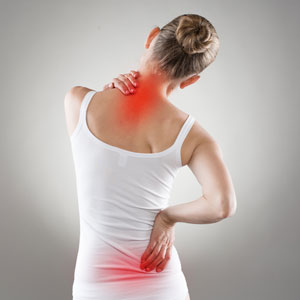 A herniated disc is a condition where the fibrous material of the gel-like cushion between your bones can tear or break down. This allows the gelatinous or fluid-like material to protrude from its normal space. A bulge is less severe, where the disc swells and pushes out of its natural shape without any tearing in the fibrous tissue, but can still be very painful.
A herniated disc is a condition where the fibrous material of the gel-like cushion between your bones can tear or break down. This allows the gelatinous or fluid-like material to protrude from its normal space. A bulge is less severe, where the disc swells and pushes out of its natural shape without any tearing in the fibrous tissue, but can still be very painful.
What Are the Main Causes of Herniated Discs?
Traumas, repetitive motions, or injuries often cause herniated discs. Dehydration and arthritic degenerative changes to the disc that impede their pumping mechanism over several years can also lead to this condition as well. When the tissue becomes dehydrated, it becomes brittle and more susceptible to breaking down, thereby facilitating herniations.
What Are Some of the Symptoms?
Symptoms of a herniated disc include the following:
- Back pain
- Neck pain
- Radicular pain extending into the arms or legs (can be to the fingers or toes)
- Numbness and tingling
- Weakness
- Sciatica
- Lack of coordination and difficult movement
To make a diagnosis, orthopedic, neurological, and imaging examinations are usually needed. An MRI is the most accurate way to diagnose the type of herniation, its location, and its severity, but may not always be necessary to determine a disc issue.
How Spinal Decompression Can Help
When a disc is herniated, medical treatment options are limited, often involving injections or surgery. The problem is that these approaches have associated side effects and complications. For instance, fusions often lead to future degenerative changes and further surgical interventions within three to five years.
Spinal decompression offers a less invasive solution. It allows the disc to reform itself under negative pressure and a specific pull pattern. This treatment can often help patients avoid unnecessary surgeries and injections, promoting more long-lasting tissue healing.
Can Herniated Discs Be Prevented?
Prevention is always better than cure. Reducing any activities that caused the disc herniation in the first place is crucial. Avoid trauma and excessive forward flexion, which puts undue pressure on the posterior or backside of discs. For instance, performing numerous sit-ups can push the lower back discs backward.
Similarly, looking down at your phone for hours can affect the discs in your neck, just like watching TV with your head propped up with several pillows. Avoid improper bending and twisting, as these actions tend to exert the most shearing forces on a disc. Understanding and respecting our body’s limitations can mitigate the risk of herniated discs and maintain our spinal health.
Put Pain in Your Past—Contact Us Today
Take that first step toward getting the relief you need so you can return to what you love in life. Contact us today to book an appointment. We also invite you to check out some of our patient testimonials on our spinal decompression and laser therapy pages!
